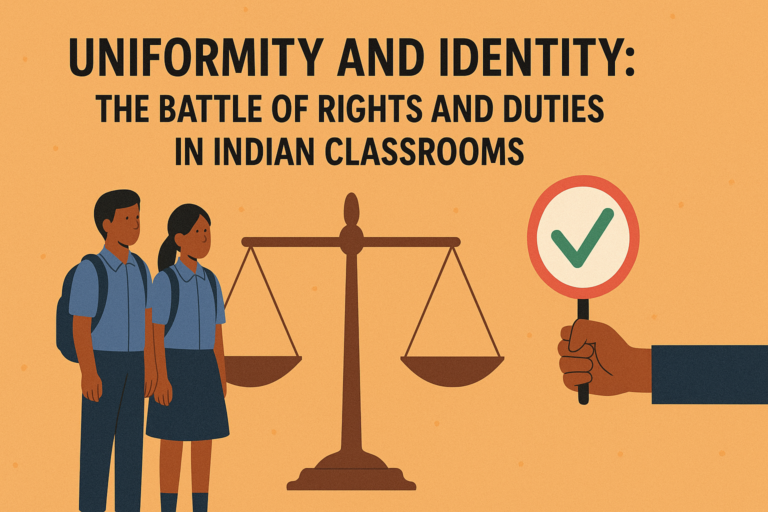
This article has been written by Jayana Mishra, and Pallavi Awasthi (Second-year students of Damodaram Sanjivayya National Law University, Visakhapatnam)
Since the establishment of human society, there has been a constant need to make society worth living for the human being. In this regard, we learned how to gather our food, how to cook, and how to form colonies to protect ourselves. After the formation of colonies, one must have felt the need to guide it in order to maintain peace and coordination among the members so people agreed to some norms which are laws. We must here realize that in no society infringement of this peace and coordination is not there. In this regard, Emile Durkheim is of the opinion that even though there exists a different level of development in society but in every society there is criminality found. Crime is one of the basic of society and cannot be called non- existent.[1] So we have criminal laws which are specific laws for wrong in the society such as theft, murder, rape, cheating, sexual abuse etc.
Howdy, you all! Welcome to your page of knowledge. You will find different legal blogs, the latest news, current affairs, and many more on this channel. This is the initiative to develop the knowledge of the law in the world, especially for you.
The codification of criminal laws dates back to the Vedic age and the current criminal justice system is entrenched on English laws and practices. As the major chunk of criminal laws are colored in the British paint even today, we see that there are no significant changes in such legislation an example being section 124 A of the Indian Penal Code. Even though trials were there to make some changes in Code of Criminal Procedure in 1973, there was appointment of Vohra and Malimath committee in 1993 and 2000 respectively but such laws guide us still.
We are aware of the certitude that for breaching law there exist certain repercussion called punishments. Sometime we use term punishment whereas sometimes we use penalty. Here Justice Mr. J.R. Lucas presents that essentially punishment is different from penalty as in the former suits well for mala in se (wrong on its own) whereas the latter are for the acts which are mala prohibitia offences (that is offences which are against law).[2]There is a significant distinction found between penalties and punishments, despite this Lucas is accurate in pointing out that such a distinction is not recognized in legal reasoning. The difference has not been made because, while authors have long recognized that one aspect of punishment is that it is ‘for an offence’–in the typical case–they have not fully defined what this means. To the degree that this aspect of punishment has received attention, authors have focused on the nature of an offence, leaving unexplained the complicated link between punishment and criminal law, the ‘for’ in the term. Perhaps the relationship has looked too straightforward to writers since Locke to deserve attention, but if the distinction between a description of punishment and its moral appraisal is not to be misconstrued, the connection should be made explicit. So construing that while penalty is damages you pay for not fulfilling certain condition for instance, a person is constructing a house for you and you need it finished by a particular date, you may include a penalty for each day he is late in the contract. He did not do anything illegal or defy any regulations; he is just being subjected to the penalty for being late. On the other hand punishment is a disincentive in response to a behavior that is against the norm, rules, or regulations. This is a thing which is not predetermined even though it can be sometimes negotiated and its obligatory. For instance, if a judge determines that he had no real design of constructing your house and was just taking your money, court may order him to pay you back (damages), along with the late fees agreed to in the contract (penalty), and extra money on top of punitive damages for being a fraudulent as punishment.
Having known criminal law and punishment we now will go through the main types of punishment available under the criminal law. As we know that Indian Penal Code provides for the act prohibited by law or which are punishable under law it also has the provisions for punishment that are given for the omission or commission of such acts. Section 53 of the Indian Penal Code defines 5 types of punishment namely First.—Death; Second.—Imprisonment for life,third.—Imprisonment, which is of two descriptions, namely:— (1) Rigorous, that is, with hard labour; (2) Simple; Fourth.—Forfeiture of property; fifth.—Fine.[3]
The death sentence
Valid or not? There have been various opinions on the death penalty’s validity, India is among the 78 retentionist countries that have retained it on the pretext that it will be given only in the case of ‘rarest of rare’ and considering ‘special reasons’.[4] Despite that what enunciates a ‘rarest of rare case’ or ‘special reasons’ has not been specified either by the legislature or by the Supreme Court.
The Indian constitution imparts to every person a fundamental right to life contingent on its restriction by the procedure established by law, it has been stated by abolitionists that sentence of death in the current form infringes the citizen’s right to life. There are legal luminaries who contest that the very fact that death penalty is continued in India runs counter to one’s right to life. It is submitted that these learned jurists probably overlook the fact that even right to life is not an absolute right.
On one hand the certitude is that death sentence is retained in Indian criminal statues (IPC Sec. 354(5)) and in judgements like Deena vs. Union of India[5] where the court upheld that section 354(5) of the I.P.C., which prescribes hanging as mode of execution is fair, just and reasonable procedure within the purview of Article 21 and thus constitutional.
The concept of Article 21 right to life enunciated in the constitution seems anti to capital punishment but it is uncontested fact that nothing in the constitution entails capital punishment as against constitution. The constitutionality of the death sentence was scrutinized time and again in many cases. For example In Jagmohan Singh vs. State of Uttar Pradesh[6], the Supreme Court, upheld the constitutionality of death penalty holding that death sentence is not infringement of Articles 14, 19 and 21 as contested.
Thus, we find that despite various attempts it remains valid and constitutional.
- Imprisonment
Section 60 of the Indian Penal Code states for the punishment of imprisonment. It states that it may be) wholly or partly rigorous or simple. Now rigorous here means with labor like making chair, weaving clothes etc. and simple means without any of these works. It is the discretion of the Court which sentences such transgressor to instruct in the sentence that such imprisonment shall be wholly rigorous, or wholly simple, or that some part of such imprisonment shall be rigorous and the remaining simple.
- Fine
The court if it may deem fit it may impose fine as an alternative for imprisonment or solely fine or fine with imprisonment. And in accordance with the provision of Section 64 of the Indian Penal Code[7] the court may also order to imprison a person if he fails to pay fine. Imposition of fine as a concept of punishment is more familiar to civil law violations as it seeks compensation for victims in form of fine. Some jurists also believe that fine is more like penalty than punishment as the former is outcome of something morally or profoundly wrong while latter as violation of statute or rule.
- Forfeiture
Now according to the provision of Section 33 of the Indian Penal Code[8] the court may order to forfeit the property of a person whether moveable or immovable where the person is convicted of any crime under the chapter iv or vi of the IPC. In simple language the court may retain the property of the criminal.
All these punishments are expected to have a reformative and retributive effect as a whole. The courts while awarding these punishments uphold that the malice of the criminal must be proved beyond reasonable doubt so as to ensure that no injustice is caused and that after awarding this punishment what repercussion it can behold. Based on this the courts award punishment which are essential for the making the world a better place.
- Arbitration Act
- Bharatiya Nagarik Suraksha Sanhita (BNSS)
- Bharatiya Nyaya Sanhita (BNS)
- Bharatiya Sakshya Adhiniyam (BSA)
- Book Review
- Business Law
- Case Law
- Civil Law
- Constitutional Law
- Consumer Protection
- Copyright Act
- Copyright Laws
- Criminal Law
- Current Affairs
- Current legal issues
- Cyber Law
- Data Protection Law
- Domestic Violence Act
- Environmental Law
- Family Law
- Income Tax
- Intellectual Property
- International Relations
- JJ Act
- Landmark Judgements
- Legal Facts
- Legal Maxims
- Legal News
- Muslim Law
- New Post
- POCSO Act
- POSH Act
- Science
- Space Law
- Uncategorized
LegalOnus
LegalOnus Law Journal (LLJ) ISSN: 3048-8338
[1] Durkheim & and Erikson John Hamlin, The Normality of Crime, Department of Sociology and Anthropology UMD 1-8 (1895).
[2]“R. J Spjut, Criminal Law, Punishment, and Penalties, 5 Oxford Journal of Legal Studies 33-46 (1985).
[3] Indian penal code, 45 I.P.C. § 53 (Legislative Department 2019).
[4] Constitutionality of Death Penalty, https://www.indianbarassociation.org/constitutionality-of-death-penalty/.
[5] Deena vs. Union of India, (1983)4 SSC 645.
[6] Jagmohan Singh vs. State of Uttar Pradesh, A.I.R. 1973, S.C 947.
[7] Indian penal code, 45 I.P.C. § 64 (Legislative Department 2019).
[8] Indian penal code, 45 I.P.C. § 33 (Legislative Department 2019).








